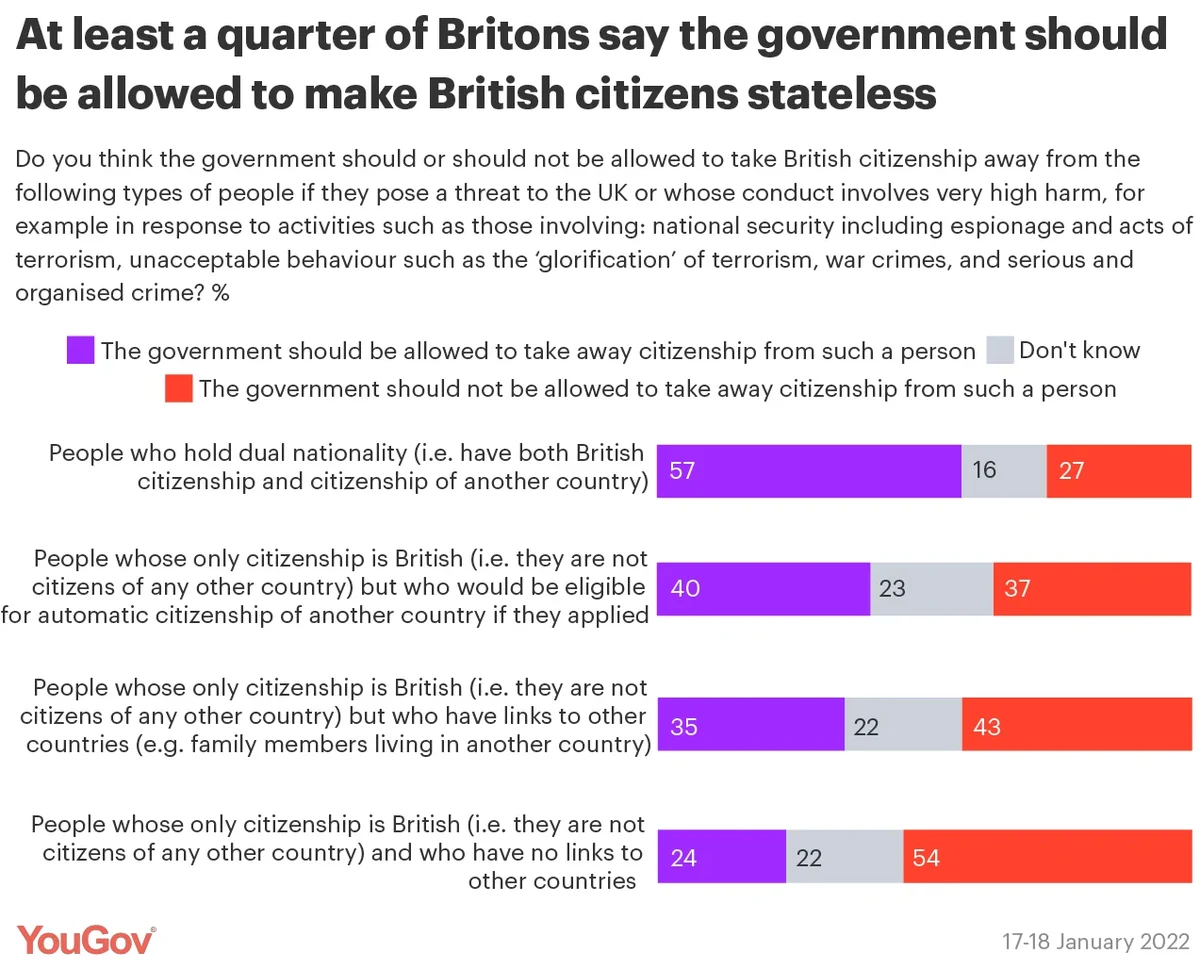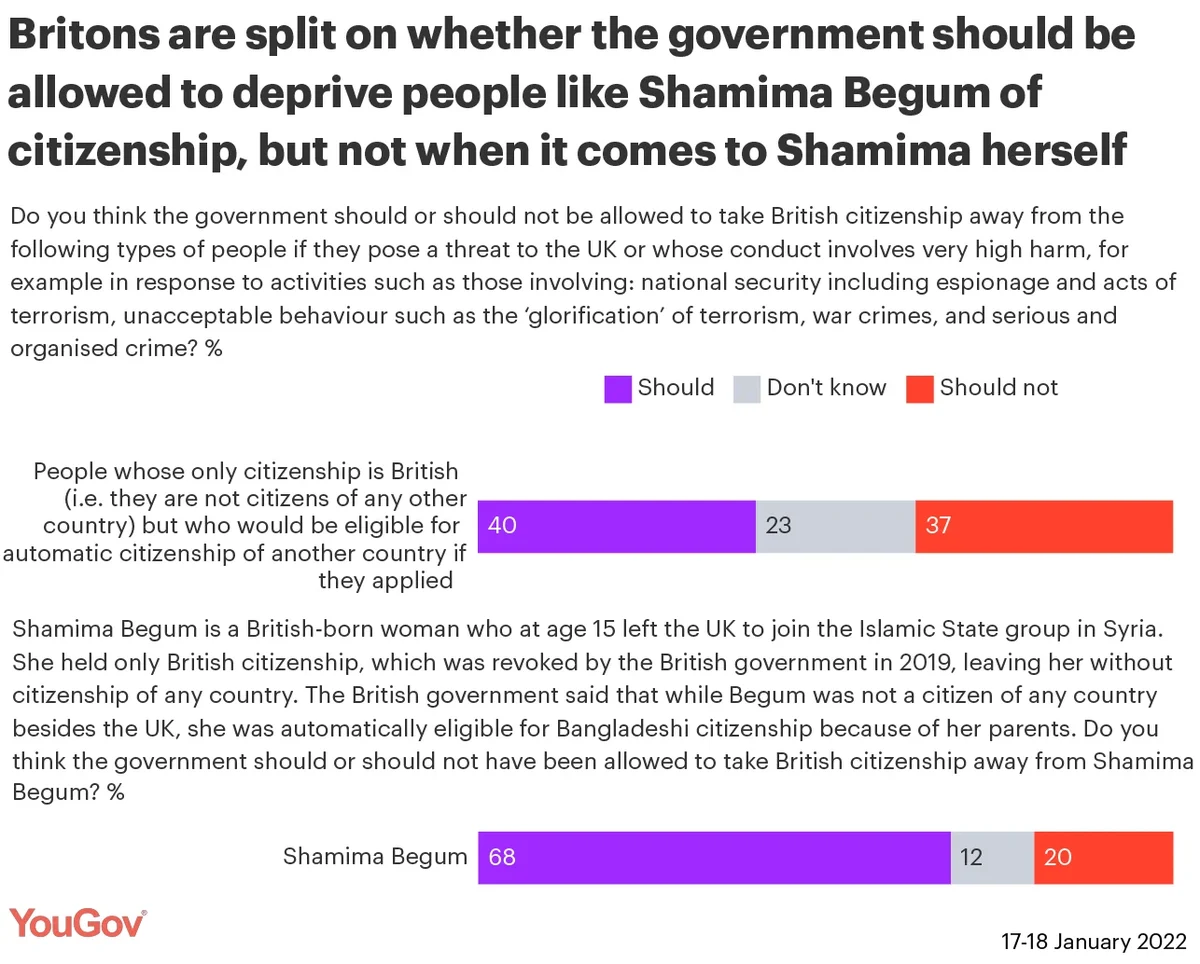Britons are split on whether the government should be allowed to deprive people like Shamima Begum of citizenship, but not when it comes to Shamima herself
The UK government is allowed to remove British citizenship from people if it is ‘conducive to the public good’ – in the interests of national security, for example, or if someone has committed serious crimes or an act of terrorism – or if someone ‘obtained their citizenship fraudulently’.
Citizenship issues have been in the news recently, with the new Nationality and Borders Bill, which is currently being considered by the House of Lords after passing the Commons on 8 December, allowing the government to strip citizenship from people without notifying them if the authorities do not have a ‘reasonably practical’ way to contact them.
The British government is not, in theory, allowed to deprive a British citizen of their citizenship if that is the only form of citizenship they have. Doing so would make them “stateless”, which is illegal under the UN Convention on the Reduction of Statelessness.
But how much does that matter to Britons? A new YouGov survey finds that a sizeable minority could support the government making British citizens stateless in certain circumstances.
In what circumstances should the government be allowed to deprive a person of citizenship?
We asked Britons about taking citizenship away from people who posed a threat to the UK, or whose activities involve very high harm, for example, espionage, acts of terrorism, glorification of terrorism, war crimes and serious and organised crime – language and examples which the government uses in its own explanation of when deprivation of citizenship can be justified.
By 57% to 27%, Britons say the government should be allowed to take away British citizenship in these circumstances from dual nationals – that is, people who have citizenship of another country – with 16% unsure.

The public is more split on whether the government should be allowed to deprive someone of British citizenship if they are only citizens of the UK i.e. if doing so would leave them stateless.
Two in five (40%) say they should be allowed to take citizenship away from someone whose only citizenship is British, but who would be eligible for automatic citizenship of another country if they applied, with 37% saying this should not be allowed. Some countries grant automatic citizenship to people whose parents are citizens of that country, but this is fairly rare.
A third (35%) think that the government should be allowed to take citizenship away from people whose only citizenship is British but who have links to other countries, such as family members in a different country, with two in five (43%) saying they should not be allowed to.
Finally, a quarter (24%) think that the government should be allowed to make a British person entirely stateless - stripping someone of their British citizenship when they have no other citizenship and no links to other countries – with more than half (54%) saying this should not allowed.
In theory, but not in practice? The case of Shamima Begum
British-born Shamima Begum left the UK at the age of 15 to join the Islamic State in Syria. She held only British citizenship, which then-home secretary Sajid Javid revoked in 2019 on the grounds of national security.
The British government argued that while Begum was not a citizen of any other country besides the UK, she was automatically eligible for Bangladeshi citizenship because of her parents. Last year, the supreme court ruled that Begum would not be able to enter the UK to appeal for her citizenship to be restored.
Shamima Begum’s case caused controversy and anger on both sides of the political spectrum, after a Sky News interview in 2019 showed her saying she was “okay with beheadings” but that she “didn’t know what she was getting into” when she left the UK for Syria. Some see her as a victim of trafficking.

Begum was technically eligible for automatic citizenship of Bangladesh through her parents, although the Bangladeshi government greeted news of her citizenship revocation by saying that she would not be allowed to apply because of her terror links.
Despite the fact that in, principle, 37% of Britons oppose making someone stateless when they would be automatically eligible for citizenship elsewhere, in the Begum’s practical example that figure withers to just 20%. Two-thirds (68%) of Britons say the government should have been allowed to withdraw her citizenship.
See full results here







